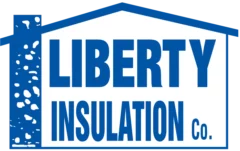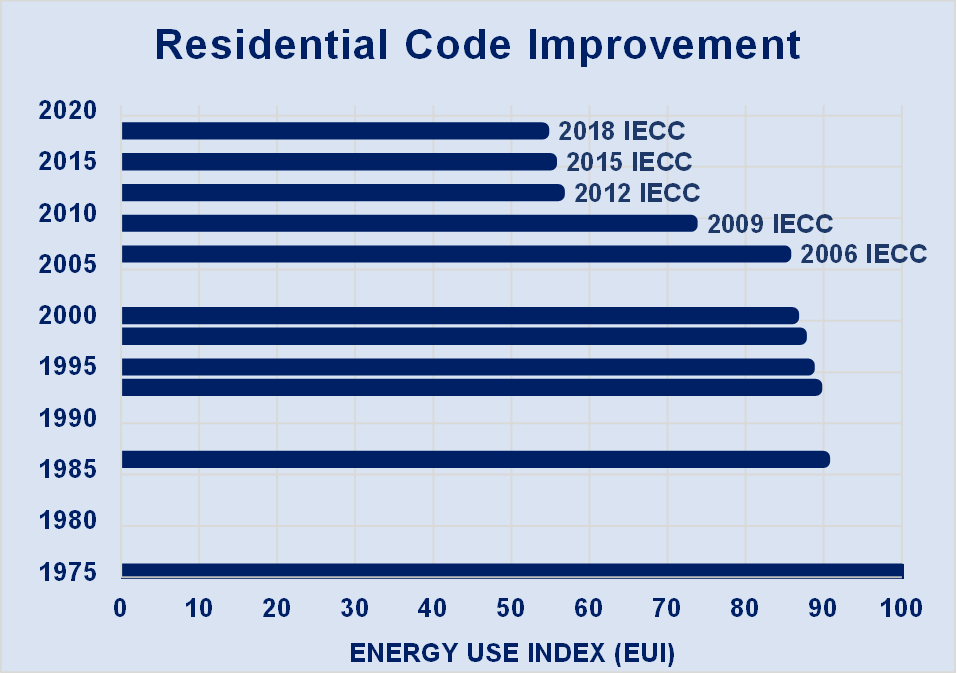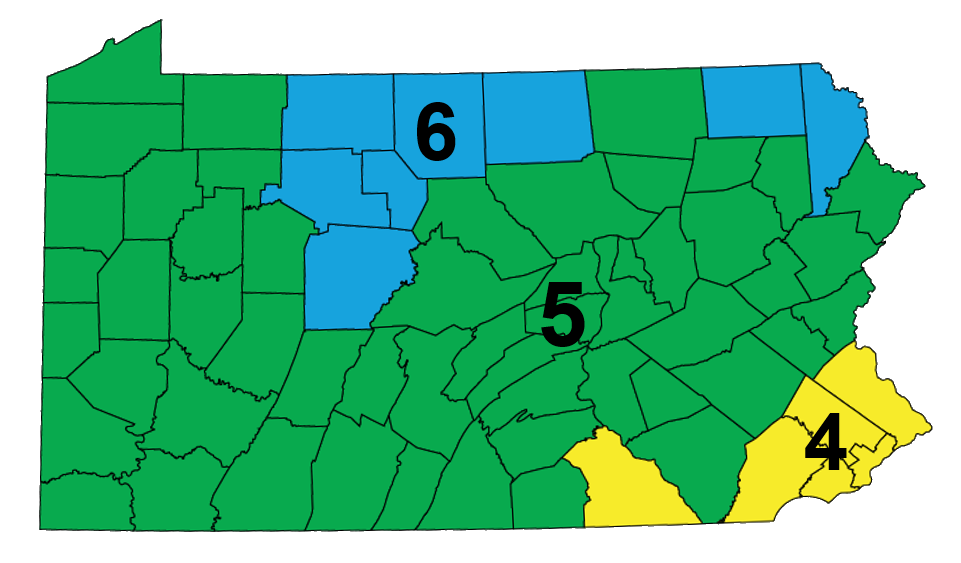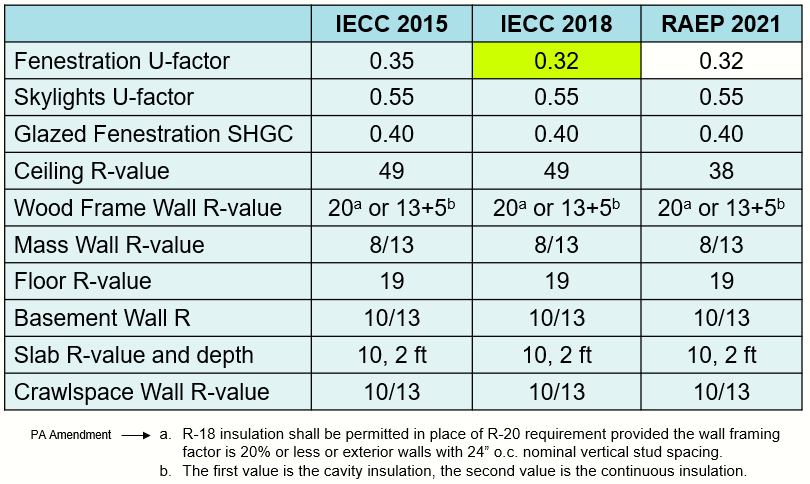In Pennsylvania, the adoption of the new set of Uniform Construction Codes (UCC) that include the 2018 International Energy Conservation Code (IECC), with specific amendments, is revolutionizing the construction and renovation of buildings. For builders, homeowners, and stakeholders in the real estate market, understanding these changes is crucial. It’s not merely about compliance; it’s about leveraging the financial, environmental, and comfort benefits of energy efficient design. Let’s look at Pennsylvania’s energy code landscape to gain an understanding of its impact and how to maximize its benefits.
The 2018 IECC in Pennsylvania: A Game-Changer for Energy Efficiency
The 2018 IECC represents a leap forward from the 2015 IECC version, raising the bar for energy performance in several key areas:
Enhanced Building Envelope
The new code introduces stricter requirements for insulation and air sealing. This change reduces heat loss and gain, leading to lower energy bills and improved comfort for residents.
High-Efficiency HVAC Systems
The mandates for higher Seasonal Energy Efficiency Ratio (SEER) ratings for air conditioners and Annual Fuel Utilization Efficiency (AFUE) ratings for furnaces ensure optimal performance and energy savings.
Advanced Lighting Controls
Requirements for LED lighting and smart controls reduce energy consumption and enhance user experience by providing better lighting solutions.
Solar-Ready Construction
Provisions in the code encourage the installation of solar panels, making it easier for you to adopt renewable energy sources.
The chart below shows the amount of energy a house uses when built to the specified year’s code. According to the PA Energy Code website: “A house built to the new codes is expected to consume nearly 50% less energy than a house built in 1975 and about 25% less energy than a house built to the 2009 IECC.”
Pennsylvania’s Unique Amendments: Adapting to Local Needs
Pennsylvania didn’t adopt the 2018 IECC wholesale; it customized it to suit the state’s specific climate zones and construction practices. Pennsylvania contains three different climate zones (4, 5, and 6) and the 2018 IECC Compliance Guide for Homes in Pennsylvania (PDF) addresses the needs of each climate zone. Notable amendments include:
- PA Alternative Residential Energy Provisions: These provisions offer flexibility to builders by allowing compliance through a combination of measures, such as installing ductless heat pumps, solar panels, or high-efficiency water heaters.
- Air Leakage Testing: More stringent requirements for air leakage testing ensure your home is airtight, preventing energy waste and enhancing efficiency.
- Enhanced Mechanical Ventilation: Increased ventilation requirements improve your home’s indoor air quality and reduce moisture-related issues, ensuring a healthier living environment.
Compliance and Enforcement: Ensuring Energy Efficiency for All
The Pennsylvania Department of Labor & Industry (L&I) is responsible for enforcing the state’s energy code. For new construction or major renovations of residential buildings, builders must obtain permits and undergo inspections to verify compliance. It’s imperative that you ensure your contractors or builders are knowledgeable and up to date with the current
energy codes to avoid non-compliance that can lead to costly delays, fines, or even the need to redo work.
Unlocking the Benefits: The Real Rewards of Energy Efficient Construction
When you build or renovate to the 2018 IECC standards, you can take advantage of numerous benefits.
Lower Energy Bills
Energy efficient homes and buildings use significantly less energy, translating into immediate and long-term savings for you.
Reduced Environmental Impact
Conserving energy helps to reduce greenhouse gas emissions, combatting climate change and improving air quality. It’s a win-win for you and the environment.
Enhanced Comfort and Health
A well-insulated, airtight building with an efficient HVAC system will maintain consistent temperatures and provide superior indoor air quality.
Increased Property Value
Energy efficient homes are more desirable to buyers, giving you the opportunity to receive higher prices in the real estate market.
| Location | Climate Zone | Estimated Annual Utility Bill Savings (%) | |
|---|---|---|---|
| North | CZ 8 | Total House | 16% |
| Heating and cooling only | 18% | ||
| CZ 7 | Total House | 15% | |
| Heating and cooling only | 19% | ||
| CZ 6 | Total House | 14% | |
| Heating and cooling only | 18% | ||
| CZ 5 | Total House | 12% | |
| Heating and cooling only | 16% | ||
| CZ 4C | Total House | 13% | |
| Heating and cooling only | 20% | ||
| CZ 4 | Total House | 12% | |
| Heating and cooling only | 17% | ||
| South | CZ 3 | Total House | 8% |
| Heating and cooling only | 14% | ||
| CZ 2 | Total House | 6% | |
| Heating and cooling only | 9% | ||
| CZ 1 | Total House | 5% | |
| Heating and cooling only | 7% | ||
| National Average | Total House | 11% | |
| Heating and cooling only | 15% | ||
Resources for Success: Navigating the Energy Code Landscape
Tap into these valuable resources to successfully navigate Pennsylvania’s energy code.
PA Energy Code website
The PA Energy Code website offers comprehensive information on the state’s energy code, including technical guides, FAQs, and training resources. The image below is a sample of the information the website provides. The image shows the updated window requirements in the 2018 IECC for York’s climate zone (zone 4). The lower the U-factor, the more energy efficient the windows.
Other Regional Resources
The PA Department of Labor & Industry website provides permit applications, inspection information, and answers to compliance-related questions.
Building Performance Association of PA is professional organization offering education, certification, and advocacy for energy-efficient building practices.
Local building departments such as City of York Bureau of Permits and Inspections can provide specific guidance on local code requirements and inspection procedures.
Here at Liberty Insulation, we’ve previously written about Staying Comfortable and Compliant: Residential Insulation Requirements in PA and Energy Savings Through Insulation in Pennsylvania.
PA Uniform Construction Code – Summary of Key Residential Code Requirements is a two-page PDF from Insulation Institute.
Creating Energy Efficient Homes Since 1987





